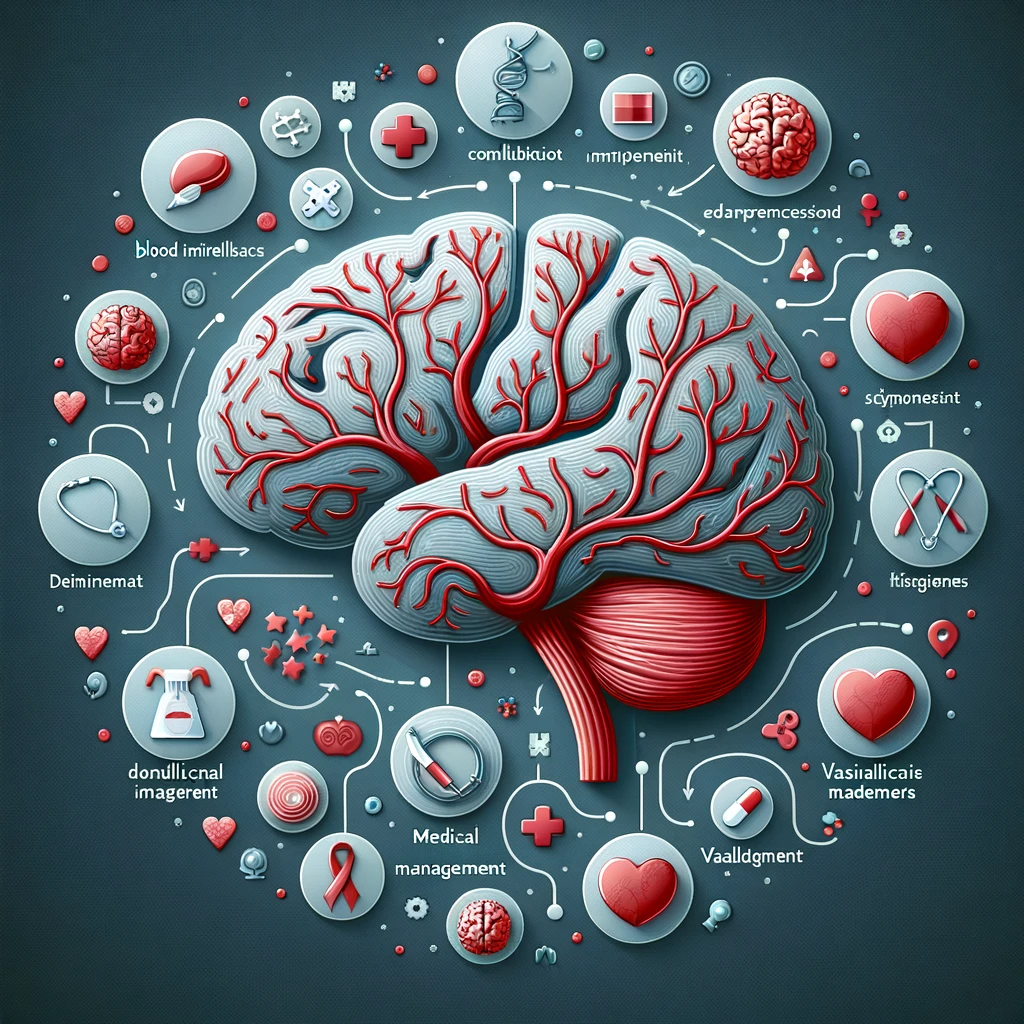Can a Stroke Cause Memory Loss?
A stroke can cause memory problems by damaging areas of the brain responsible for storing, processing, or retrieving information. Memory loss may be temporary or permanent, affecting short-term or long-term memory, making daily tasks and independence more challenging.

Overview of Stroke and How it Affects Memory and Vascular Dementia
A stroke is a medical emergency that happens when the blood supply to parts of the brain is cut off, interfering with the brain’s ability to function. It can cause short-term and long-term damage to the brain’s cells, leading to physical disability and cognitive issues, such as memory loss.
Memory is the ability to store, retain, and recall information. The brain utilizes various kinds of memory, including short-term and long-term memory. When there’s been interference to the brain caused by a stroke, it can cause a disruption in memory and other cognitive functions. Up to 60% of stroke survivors develop cognitive impairment within a year, ranging from mild issues to more severe forms that affect daily life.
Strokes are a medical emergency that can have long-lasting effects. One of the most significant effects of a stroke is memory loss, which can come in various forms and impact different memories. Here, we’ll explore how a stroke can cause memory loss and what you can do to cope with its effects.
First, we’ll discuss the different types of memory that can be impacted by stroke. We’ll then look at the signs and symptoms of stroke-induced memory loss and the different types of memory problems that can result. We’ll also review practical strategies for coping with memory loss due to stroke, as well as providing caregiving for someone who has experienced a stroke. Finally, we’ll go over tips for preventing stroke and the ways in which technology can help manage memory issues.
It is important to remember that there are treatments available for memory loss due to stroke. While it can be overwhelming to grapple with the changes, you don’t have to go through it alone. Knowing how a stroke can cause memory loss and how to manage its effects can help make life easier. Let’s get started by taking a look at how strokes affect the brain.
When a stroke occurs, it can have a huge impact on the brain and body. Memory loss is one of the most common effects observed, and the degree to which it affects people can vary significantly. In this guide, we’ll explore how a stroke can cause memory loss, the various types of memories that may be impacted, the signs to watch out for, available treatments, tips for prevention, and the steps families can take to provide caregiving and support. Vascular dementia, the second most common type of dementia, can also arise due to strokes, resulting from brain damage caused by either large or multiple small strokes. Recognizing and treating underlying vascular diseases early is crucial in managing this condition.

Overview of Stroke and How it Affects Memory
A stroke is a medical emergency that happens when the blood supply to part of the brain is cut off. This can happen due to a blocked artery or the bursting of an artery in the brain. When this happens, the brain is deprived of oxygen and nutrients, which can damage or destroy brain cells. Depending on where the stroke happened, it may affect different parts of the brain and cause different types of memory issues.
Memory loss can happen with any type of stroke, depending on the area of the brain affected. Some types of memory loss that can be caused by stroke include:
- Visual memory
- Language memory
- Emotional memory
The effects of stroke-induced memory loss can range from mild to severe, including mild cognitive impairment, depending on the type of memory and the severity of the stroke. It’s important to remember that everyone experiences different effects from stroke, so it’s important to discuss your own situation with a medical professional.
When a stroke occurs, the effects on memory can be devastating. It is important to understand which types of memory can be impacted by stroke in order to be able to effectively manage the condition.
The various types of memory that can be affected by stroke include:
- Visual Memory: Visual memory is the ability to recall images and visual information. This form of memory is often impacted by stroke since it involves the processing of visual stimuli. Those with a stroke may have difficulty registering or recalling faces, colors, and shapes.
- Language Memory: Language memory is the ability to comprehend, remember, and use language. Strokes typically affect language-related areas of the brain, resulting in aphasia, a disorder characterized by difficulties with speaking, understanding, reading, and writing.
- Emotional Memory: Emotional memory is the ability to remember past experiences and their associated emotions. Strokes may impair emotional memory, resulting in feelings of confusion, anxiety, and depression.
It is also important to keep in mind that there are different types of memory loss. Some people may suffer from short-term memory loss, while others may experience long-term memory loss. Different treatment plans and coping strategies may be needed for each type of memory loss.
Controlling high blood pressure is crucial in preventing strokes and the associated memory issues.
Types of Memory that Can Be Impacted by Stroke
Strokes can impact various types of memory, depending on what part of the brain has been affected and how severe the damage is. The most commonly impacted memories are visual memory, language memory, and emotional memory.
Visual memory deals with storing and recalling images and is often the first to be affected by stroke, as it is based in the occipital lobe. This can lead to difficulty recognizing people or familiar places.
Language memory can also be impacted by stroke, especially when there has been damage to the temporal lobe. Language memory is responsible for understanding and using spoken or written language, as well as finding the right words to express oneself. This type of memory can be impaired either temporarily or permanently after a stroke.
Emotional memory is tied to the limbic system of the brain and can be compromised by stroke as well. This type of memory is responsible for our ability to feel emotions, including both positive and negative feelings. Emotional memory can be impacted by stroke in different ways, such as difficulty recognizing facial expressions or changes in personality.
When it comes to memory loss after stroke, understanding the signs and symptoms of stroke-induced memory loss can be critical in getting the help and support you need. Cognitive decline is a common issue among stroke survivors, with many experiencing various degrees of cognitive impairment, which can severely impact daily functioning and quality of life. Some of the most common signs and symptoms of stroke-related memory loss may include:
• Difficulty forming new memories, including recalling recently learned information.
• Trouble remembering recent conversations, events, or experiences that took place.
• Confusion when presented with new information or unfamiliar surroundings.
• Struggling to remember names or faces, even familiar ones.
• Feeling lost or disoriented in familiar places.
• Taking longer than usual to process information or complete tasks.
• Difficulty following a sequence of directions or steps.
• Forgetting words or phrases in the middle of conversations.
Sudden confusion, characterized by a rapid onset of disorientation and attention deficits, can also be a symptom of stroke-induced memory problems.
It’s important to note that each person’s experience with stroke-induced memory loss is unique, so the severity and nature of the symptoms may vary from person to person. If you notice any of these signs or symptoms in yourself or someone else, it’s best to seek professional medical assistance right away.
Signs and Symptoms of Stroke-Induced Memory Loss
Stroke-induced memory loss can take many forms, ranging from being unable to recall recent events to struggling to recognize familiar faces and places. Here are some of the signs and symptoms associated with stroke-induced memory loss:
- Difficulty concentrating or focusing on tasks
- Inability to remember certain words or names
- Getting lost in familiar places
- Forgetting important dates or appointments
- Trouble with short-term memory tasks like remembering grocery lists
- Poor judgment or decision making
- Unable to follow directions or instructions
If you or someone you love is experiencing any of these symptoms, it's important to contact your healthcare provider as soon as possible for proper diagnosis and treatment.
Short-Term Memory Loss After Stroke
A stroke can cause short-term memory loss, which is the inability to recall recent events or conversations. It usually lasts for a few weeks or months after the stroke and can be debilitating. Short-term memory loss after stroke has several potential causes—damage to the brain or its blood vessels, reduced cognitive function, and increased fatigue.
Some of the most common signs of short-term memory loss after stroke include difficulty remembering recent conversations, forgetting names or instructions, creating confusion between familiar objects, and struggling to answer simple questions.
The severity of the memory problems after stroke will vary depending on the individual and the type of stroke they had. Some people may experience only mild memory deficits, while others may have more severe issues that require medical intervention.
If you’re experiencing short-term memory loss after stroke, it’s important to talk to your doctor so they can help you manage the symptoms. They may recommend medications or other therapies to help improve your memory, as well as lifestyle changes that can make it easier to cope with the effects of stroke. Incorporating certain tasks into your daily routine can also aid in memory retention. These tasks should be performed consistently and broken down into manageable steps to improve recall.
Long-Term Memory Loss After Stroke
Stroke can cause long-term memory loss, which can make everyday activities and tasks more difficult. Long-term memories are those which are stored in the brain and are recalled over time. They include memories from childhood, such as details about friends, family, or places, or even more recently acquired information, like personal facts.
However, it is possible to manage these effects and help yourself cope with long-term memory loss after a stroke. One of the primary goals of these coping strategies is to improve cognitive function. Here are some tips for dealing with long-term memory loss:
- Develop a routine: Routines can help you stay organized and be more productive. Establish a set schedule for waking up, eating meals, and completing tasks.
- Organize your space: Having a neat and organized living area can help you keep track of things and remember tasks easier.
- Make lists: Writing down to-do lists and important notes can help jog your memory and remind you of tasks that need to be done. You can also use electronic devices or apps to store notes and other memos.
- Use visual reminders: Visual reminders, such as post-it notes or calendars hung up on the wall can help you remember upcoming appointments or events.
- Make time for yourself: Stress and fatigue can wreak havoc on your memory. Make sure to take time for yourself to relax and recharge.
- Encourage a healthy lifestyle: Eating a healthy diet, getting regular exercise, and engaging in physical activities can help improve your memory and overall mental health.
These tips can help you cope with the effects of long-term memory loss after a stroke. However, if you feel that you are struggling to remember important information or tasks, don’t hesitate to seek medical advice from a healthcare professional.
Examples of Memory Problems After Stroke Memory problems after stroke can manifest in several ways. In some cases, stroke survivors may experience difficulty retaining information due to short-term memory loss. This can affect their ability to remember recent events or conversations.
Additionally, stroke survivors may not be able to recognize people they know, remember specific details or dates, or recall previously learned information. This type of memory loss is commonly linked to long-term memory loss.
Stroke survivors may also forget how to do everyday tasks, such as buttoning a shirt, or losing the ability to navigate the structure of familiar buildings such as schools or malls. All of these problems can be linked to stroke-induced memory loss.
Examples of Memory Problems After Stroke
Post-stroke memory issues can range in severity, but the most common symptoms include difficulty remembering recent events, not being able to recall information, and not recognizing familiar faces or places.
Alzheimer's disease is a related condition that can exacerbate memory problems after stroke.
Recent memories are often the most affected by stroke. This can lead to challenges with remembering conversations, names, or even recent activities. Not being able to recall information is also a common problem, and can manifest in difficulty with learning new things or recalling previously learned information.
Finally, not recognizing familiar faces or places is a symptom of memory problems after stroke that can be very difficult to cope with. It can be hard to adjust to not being able to recognize your friends or family members, or to find yourself in confusing new settings without being able to remember how you got there.
When dealing with memory loss due to stroke, it’s important to find coping strategies that will work best for you. Here are some ideas that may be helpful:
• Develop a new routine. Establishing a daily routine and setting reminders can help you stay organized and active.
• Utilize visual reminders. Post-it notes, calendars, and other visual reminders can help with tasks that you need to do or remember.
• Make use of apps. There are many mobile apps available that can help with memory recall and remind you of important dates and events.
• Exercise regularly. Research has shown that regular physical exercise can help improve memory after a stroke.
• Improve your diet. Eating healthy foods and avoiding processed and junk food can also help to improve memory following a stroke.
• Get enough sleep. Getting adequate sleep is essential for good cognitive functioning, so make sure to get enough rest each night.
• Practice relaxation techniques. Managing stress can help improve memory following a stroke, so practice mindfulness and relaxation techniques to reduce stress.
• Be patient with yourself. Memory loss is a difficult process, so it’s important to have patience with yourself as you adjust to the changes.
• Reach out for help. Finally, don’t hesitate to reach out for professional help if needed. A therapist or counselor may be able to assist with coping strategies and emotional support.
Coping Strategies for Memory Loss Due to Stroke
Coping with memory loss due to stroke is challenging, but there are some strategies you can use to help manage its effects. These include:
- Develop a New Routine: Developing a consistent daily routine can help support memory and reduce confusion. You may find it helpful to write down your schedule, and use it as a reference point.
- Create Visual Reminders: Creating visual reminders – such as sticky notes or signs around your home – can help jog your memory and remind you of tasks you need to do.
- Use Mobile Apps: Technology can be leveraged to assist with managing post-stroke memory issues. There are many apps available that can help you stay organized and track your progress.
Although these strategies may not be able to eliminate the memory issues due to stroke, they can help to make day-to-day activities more manageable. It's important to remember to be kind to yourself and acknowledge your achievements, however small.
Accessing professional support for stroke-related memory loss is key to ensuring that the person affected by the stroke is able to manage the effects of their condition.
There are different types of professional help and support that can be accessed depending on the individual needs of the person suffering from stroke-induced memory loss.
Some of the most common options include:
- Therapy: Cognitive behavioral therapy, or CBT, is a form of therapy that can help people with stroke-induced memory loss cope with the condition. It helps to identify and replace negative thought patterns with more positive ones, aiding in managing symptoms.
- Counseling: Counseling will involve talking with a qualified counselor or therapist about the condition, offering emotional support and guidance. It can also help provide strategies for managing the symptoms of stroke-induced memory loss.
- Medication: There are certain medications available to treat the symptoms of stroke-induced memory loss. Medication should be discussed with a physician as they will be able to determine the best course of action for the individual.
In addition to professional help, there are also various support groups available for people living with stroke-induced memory loss. These support groups can be a great source of information and can provide mutual support from those who have had similar experiences.
Managing memory loss due to a stroke often requires professional help. There are many sources of care available, including therapy, counseling, and medication. It's important to discuss treatment options with your doctor and find a provider who is knowledgeable and experienced in managing stroke-related memory issues.
Therapy typically involves cognitive and behavioral therapy, which can help you build strategies to deal with memory loss and reduce the impact of symptoms. Counseling may also be helpful, as it can provide emotional support and help you manage stress and anxiety that may be caused by memory loss.
If medication is necessary, your doctor may prescribe certain types of drugs to improve memory or reduce the symptoms of memory loss. Every patient is different, so it's important to discuss the various options available to determine which treatment plan is best suited for you.
Providing caregiving for someone who has experienced memory loss due to a stroke can be a difficult and emotional experience. It is important to remember that they are not alone, and there are steps that can be taken to make sure they get the support they need.
First, it is important to ensure that the person with memory loss is comfortable with their caretaker. When providing care, maintain a positive attitude and provide gentle reminders about memories or events. Use simple language and avoid overwhelming them with too many instructions.
It is also important to keep stimulating the person with memory loss. Encourage them to participate in activities that interest them, and offer assistance when needed. Art therapy and music therapy can both be helpful in helping to stimulate the mind and aid in the recall of memories.
In addition, creating visual reminders can be a helpful tool in providing caregiving for someone with memory loss due to a stroke. Hang pictures, notes, or logs around the home as visual cues to remind the person of their daily routine activities. Utilizing apps and digital tools to help them to stay organized can also be beneficial.
Finally, it is important to provide emotional support to the person with memory loss. Offer words of encouragement and understanding, and try to focus on their successes and achievements rather than their current limitations. Above all, reassure them that they are safe and cared for.
Providing Caregiving for Stroke Survivors During Memory Loss
When someone close to you is going through the struggles of memory loss due to stroke, providing supportive care can be one of the most powerful ways to help them. Here are some practical tips for giving care:
- Offer encouragement: Showing love and support can make a huge difference in helping your loved one cope with their memory loss. Encourage them to work on managing their symptoms and to stay positive.
- Keep calm: It's natural to feel overwhelmed when your loved one is having difficulty remembering things, but try to remain patient. Keeping a calm demeanor will help your loved one stay calmer too.
- Utilize personal strategies: Figure out what helps your loved one remember things better. This could include note-taking, wearing a reminder bracelet, or making use of calendars and schedules.
It may take some time and practice to find the right caregiving approach for your loved one, but it is possible to provide meaningful support. With patience and understanding, you can take steps towards helping your loved one manage their stroke-induced memory loss.
In the world of modern technology, there are numerous ways to help people manage memory loss due to stroke. There are a range of virtual tools and online resources available that can assist with cognitive functioning after a stroke.
Virtual tools such as computer or online programs can be beneficial for tracking progress and providing feedback to help hone in on mental and physical tasks. These virtual activities can improve memory and problem-solving skills, helping with conditions such as dementia or post-stroke aphasia.
Online resources can be helpful in managing memory problems after stroke. Online support groups provide a safe space to ask questions and seek advice from peers that can relate to the same experience. Additionally, web-based cognitive training programs can offer personalized exercises that are specifically designed to help with memory issues after stroke.
In addition, apps can be incredibly useful for improving memory and cognitive functioning. From meditation apps that reduce stress to memory games that help stimulate the brain, there are tons of innovative solutions that make managing stroke-related memory issues more manageable.
Overall, technology has come a long way in providing support for those dealing with the aftermath of stroke. By utilizing these helpful resources, individuals experiencing memory problems due to stroke can gain back control over their lives and have access to a plethora of tools to help them cope.
Using Technology to Manage Memory Issues After Stroke
The advancements in technology over the last few decades have made it possible to use a range of tools and resources to assist with managing post-stroke memory issues. From virtual memory aids and online support groups to mobile apps and activity trackers, there are a variety of options available to those looking to better manage stroke-associated memory loss.
Virtual memory aids are convenient and easy-to-access tools that can help individuals recall forgotten details or events. These might include lists, calendars, and notes which can be accessed via phones, tablets, and computers. Other helpful online resources include support forums that provide emotional support and knowledge-share, as well as webinars, seminars, and videos on topics related to stroke and memory loss.
Mobile apps provide easy access to a range of support options and are particularly useful for those with mobility issues or limited access to computer systems. Many apps are designed to help individuals keep track of appointments, tasks, medications, and daily activities. Additionally, activity trackers that monitor physical activity and dietary habits are helpful for staying healthy and keeping track of progress.
Overall, technology can be an invaluable resource for managing memory issues related to stroke. Utilizing these tools can make life easier and more manageable, helping individuals live a comfortable and productive life.
Stroke prevention tips can be implemented to help reduce the risk of stroke-induced memory loss. A few of these measures include:
• Eating a balanced diet with plenty of fruits and vegetables. • Exercising regularly to maintain a healthy weight and keep blood pressure in check. • Reducing stress levels by practicing relaxation techniques such as yoga or meditation. • Limiting alcohol consumption and avoiding drug use. • Not smoking, as this increases the risk of stroke. • Talking to your doctor about any stroke risk factors you may have. • Taking prescribed medications as advised by your doctor. • Monitoring blood pressure and cholesterol levels regularly. • Regularly checking for any warning signs of stroke.
Stroke Prevention Tips to Avoid Memory Loss
It's important to take proactive steps to prevent strokes from happening in the first place, which can help you avoid memory loss and other serious consequences. Here are some tips for stroke prevention:
- Eat a nutritious and well-balanced diet with plenty of fruits, vegetables, and whole grains.
- Avoid unhealthy fats, foods high in sodium, and processed sugary snacks.
- Monitor your blood pressure and cholesterol levels and take medications as prescribed.
- Exercise regularly and maintain a healthy body weight.
- Limit alcohol consumption.
- Quit smoking and avoid second-hand smoke.
- Manage stress in healthy ways, such as yoga, meditation, and counseling.
By taking steps to address these lifestyle risk factors, you can help reduce your risk of stroke and the related consequences, such as memory loss.
In conclusion, stroke can have significant consequences on a person's memory. The type and extent of memory loss can vary based on the severity of the stroke, but it is possible to manage memory issues through lifestyle adjustments, therapy, medication, and other forms of professional support. It is important to be aware of the signs and symptoms of stroke-induced memory loss in order to seek help early on. Through prevention and smart coping strategies, stroke survivors can live a rich and meaningful life despite any memory issues they may experience.
Conclusion: Taking Action
We've now discussed the various ways in which a stroke can cause memory loss, as well as treatment options and strategies for managing the condition. It's important to remember that while memory loss is a serious condition, there is help available.
If you or a loved one have experienced a stroke, it's essential to access professional help as needed. Additionally, making small lifestyle changes to help manage the symptoms of memory loss can be incredibly beneficial.
These lifestyle changes can include things like regular exercise, stress management techniques, and avoiding smoking and drinking. In addition to accessing professional help, these proactive steps can make a world of difference for your overall well-being.
By following this guide, we hope to have given you a better understanding of the effects of a stroke on memory, as well as the resources available to you.
We encourage you to take action and reach out for help when needed. With the right care and support, managing the effects of stroke-related memory loss is achievable. Thank you for reading!
You might also like this article:













